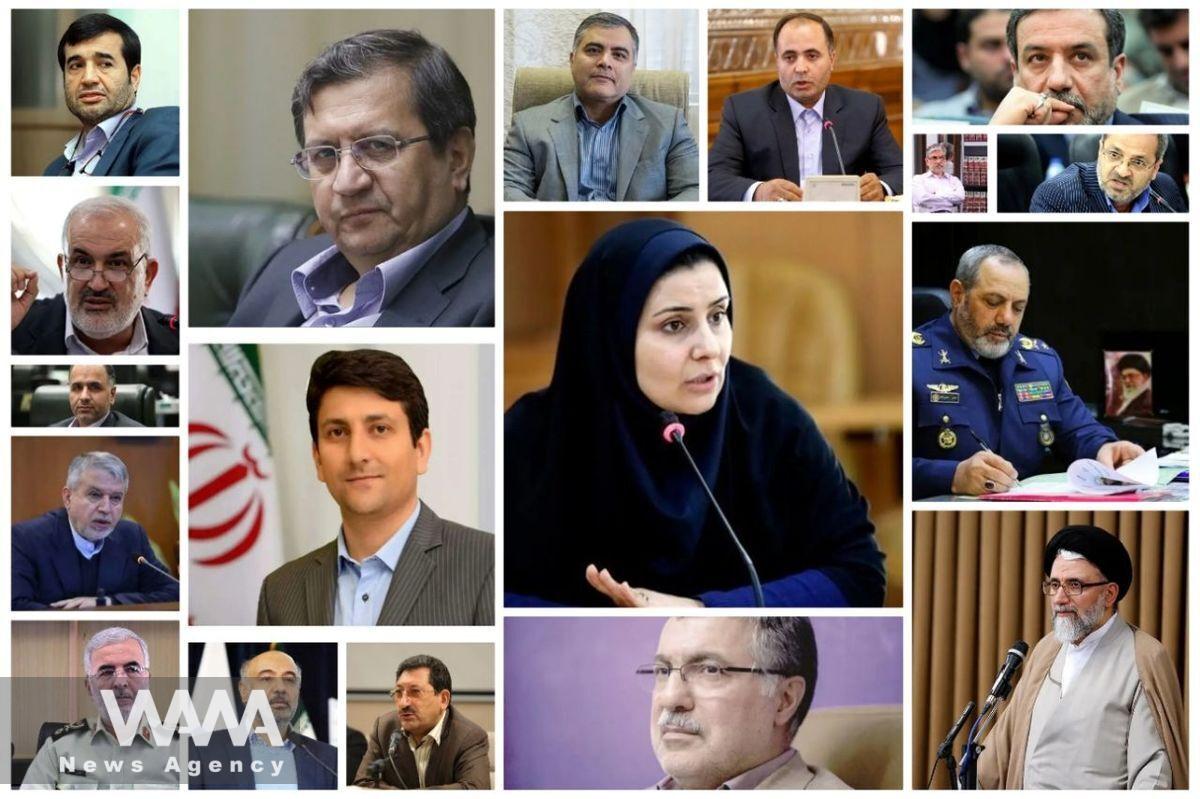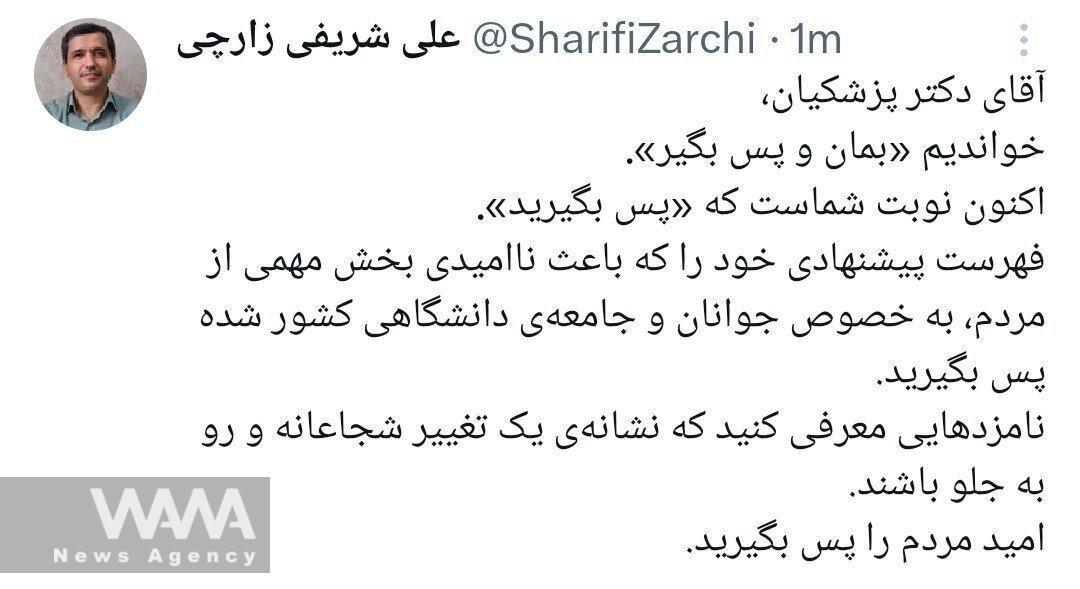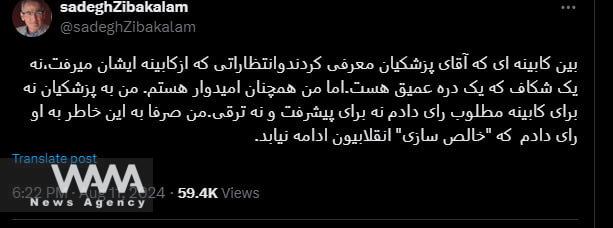A Surprising Choice: Pezeshkian and the Cabinet That Shocked Everyone
WANA (August 14) – “Our aim has always been to form a unity government, where capable individuals from every faction and group are present in the cabinet.” These were the words of Massoud Pezeshkian, Iran’s new president, before announcing his list of ministers to the parliament.
The announcement of the proposed cabinet for the fourteenth government triggered a wave of reactions in Iran’s political scene, placing Pezeshkian unexpectedly at the center of criticism from his own allies.
During his election campaign, Pezeshkian emphasized forming a national unity government, one that, according to him, would represent all social and political factions of the country.
The Strategic Council, led by Mohammad Javad Zarif, the former foreign minister in Hassan Rouhani’s government, was tasked with selecting ministers based on merit, experience, and commitment to the reformist agenda. This council initially promised a transparent process for selecting ministers, based on a rigorous scoring system.
The scoring system designed for selecting ministers comprised three main criteria:
1. Expertise and Experience: Each proposed minister needed to have sufficient expertise in their respective field and considerable experience in high-level management.
2. Commitment to Reforms: This criterion included the minister’s dedication to implementing reformist programs and their ability to bring about the desired changes.
3. Political Acceptance: This criterion referred to the minister’s ability to garner support from various political factions and maintain constructive interactions with parliament and other institutions.

The proposed ministers of the 14th government cabinet were presented to the Islamic Consultative Assembly (Majles) by Masoud Pezeshkian / WANA News Agency
This scoring system was intended to introduce ministers who would be both successful in their fields and capable of advancing reformist programs. However, what unfolded in reality was not what many reformists had anticipated.
In seeking diverse advice from moderates and aiming to gain parliamentary approval, Pezeshkian introduced a cabinet that considered a broader political balance.
This cabinet included figures from various political factions, which sparked harsh criticism from reformists. Many of the proposed ministers were not reformists but rather moderates or even conservatives, leading to widespread discontent among reformists.
A wave of protests against Pezeshkian’s proposed cabinet spread across social media, with radical reformists pushing for more extreme changes much sooner than expected.
The first significant reaction to this list came from Mohammad Javad Zarif, who implicitly criticized the list of ministers and resigned from his position as head of the Strategic Council, which Pezeshkian had appointed him to just a few days earlier.
Zarif’s resignation revealed that there were serious differences of opinion even within the Strategic Council. Earlier, the Iranian Intelligence Minister had stated that Zarif’s resignation was due to his son’s dual citizenship, suggesting that Zarif had not been entirely honest about the reasons for his disqualification and had cleverly concealed the real issue by criticizing the proposed cabinet.
Ali Sharif Zarchi, a university professor and reformist figure, explicitly urged Pezeshkian to withdraw the list of ministers and introduce individuals who symbolized bold changes. Sadegh Zibakalam, another university professor and government critic, sharply criticized the cabinet’s composition, stating that there was a deep gap between expectations and the reality of the cabinet.

Ali Sharif Zarchi, a university professor and reformist figure, called on Pezeshkian via his X page to withdraw the list of ministers and introduce individuals who would symbolize bold changes / WANA News Agency
Azar Mansouri, the head of the Reformist Front, believes that this cabinet “represents the continuation of the status quo and, instead of mending the rift between the government and society, only deepens it.” Mansouri suggested that for ministries where the proposed ministers faced criticism, temporary leaders should be appointed until individuals with a more reformist approach could replace them.
Reformists are dissatisfied and angry with Pezeshkian’s choices for several reasons. One of the main reasons is that many of the figures proposed for ministries are not only not reformists but also have a history of close ties with conservatives or even the previous government.
These choices contradict the expectations of reformists who supported Pezeshkian on the promise of radical and fundamental changes.
Another source of frustration is the complete disregard for certain prominent reformist figures who were expected to hold positions in the new cabinet. These individuals, including notable university and reformist figures, believe they played a crucial role in Pezeshkian’s victory. Now, radical reformists feel sidelined in the new political landscape and perceive themselves as being relegated to the margins.
A Unity Government or a Cabinet with Minimal Tension?
Pezeshkian, however, understanding the political realities, chose a different path and decided to pursue a more moderate approach rather than aligning with the radical reformist movement. “I proposed a national unity government because I believe that in all previous governments, there were people who wanted to work for the country’s and the people’s interests, and we should use all these capacities.” Accordingly, the new president followed his stated intentions in selecting his cabinet.
By introducing figures from various factions, from conservatives to moderates and even some individuals close to the previous government, he aims to form a cabinet that would face the least opposition from parliament and the leadership. Although this approach may seem politically astute, it has disappointed some of his reformist supporters.
For instance, the selection of figures like Esmail Khatib, Abbas Aliabadi, and Mohammad Eslami, who were close to Ebrahim Raisi’s government, indicated that Pezeshkian intends to form a balanced team to avoid serious tensions and opposition.

Sadegh Zibakalam, a university professor and critic of the government, strongly criticized the composition of the cabinet on his X page, stating that there is a deep chasm between expectations and the reality of the cabinet / WANA News Agency
Why Is Pezeshkian Avoiding Alignment with Radical Reformists?
Why did Pezeshkian refuse to align with the radical reformist movement and pursue a confrontational approach with the system from the start? It seems that, understanding the sensitive situation of the country and the need to reduce political tensions, he decided to seek balance and calm rather than radical and fundamental changes. He knew well that forming a radical cabinet could exacerbate internal group conflicts and even lead to the government’s failure in parliament.
In the end, Pezeshkian chose to prioritize broader political considerations over his reformist rhetoric. Although this decision came at the cost of losing support from some reformists, it reflects his realism and deep understanding of Iran’s complex political situation.
Massoud Pezeshkian neither wants to be like Mohammad Khatami, the elected president of the reformists, who adopted a radical approach to reforms and faced the wrath of the system, nor like Mir Hossein Mousavi, who, by supporting the radical policies of the reformists and inciting street conflict, ended up under house arrest.
He also does not want to follow in the footsteps of the moderate Hassan Rouhani, who became unpopular due to his sluggish management of the country, nor adopt the extreme political actions of Mahmoud Ahmadinejad.
Can Pezeshkian’s New Ministers and His New Moderate Policy Manage a Country Full of Events and Challenges Like Iran?












